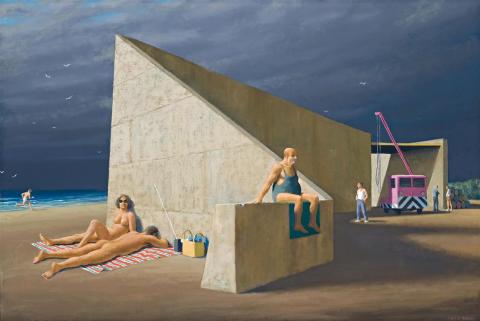SUNBATHERS AT CONSTRUCTION SITE, 2003
JEFFREY SMART
oil on canvas
68.0 x 100.0 cm
signed lower right: JEFFREY SMART
Australian Galleries, Melbourne
Private collection, Sydney (on loan to the Orange Regional Gallery from 2005 – 2007)
Deutscher and Hackett, Melbourne, 29 November 2007, lot 17
Private collection, Sydney
Jeffrey Smart: Paintings and Studies 2002 – 2003, Australian Galleries, Sydney, 23 September – 18 October 2003 (label attached verso)
Philanthropy Rules OK?, Orange Regional Gallery, New South Wales, 10 March – 23 April 2006
Grishin, S., 'Jeffrey Smart's Eternal Order of Light and Balance' in Jeffrey Smart: Paintings and Studies 2002 – 2003, Australian Galleries, Melbourne, 2003, p.13 (illus.)
Grishin, S., ‘Smart put a new iconography in the frame: Sasha Grishin pays tribute to iconic artist Jeffrey Smart’, Obituary, The Sydney Morning Herald, Sydney, 21 June 2013 (illus.)
Figure Study for Sunbathers at Construction Site, 2003, conté on paper, 31.0 x 48.0 cm
First Study for Sunbathers at Construction Site, 2003, oil on canvas, 39.0 x 59.0 cm
Second Study for Sunbathers at Construction Site, 2003, oil on canvas, 46.0 x 69.0 cm
‘Anyone can learn to paint, but few can make a picture; anyone can learn to write but few can make literature. That’s the mystery... To me a successful painting has what T.S. Eliot called ‘the stillness of a Chinese jar’. That is something l try to achieve in everything l paint…’.1
Undoubtedly one of the great paradoxes – and crowning achievements – of Jeffrey Smart’s legacy is that symbols of modernity, pressure and activity such as a freeway or construction site should be imbued with a timeless aura of stillness, order and harmony more akin to the art of the Italian Quattrocento. For indeed, while drawing inspiration from the urban environment, Smart’s immaculate compositions remarkably bear no trace of the chaos or randomness of the world from which they derive. Rather, he skillfully deconstructs the modern city, reducing it to pure geometrical forms in the manner of his artistic mentor Cezanne to encourage his audience to see the ‘everyday’ with fresh eyes, to discern beauty in the most unprepossessing, unromantic of subjects. As articulated eloquently by Smart in his oft-quoted adage, ‘the subject matter is only the hinge that opens the door, the hook upon which one hangs the coat’.2
FXJ75422.JPG
Far from endorsing an aesthetic of post-modernist indifference however, the selection of subject matter for Smart is, rather, the result of inspiration or, in his words, ‘an act of enchantment’.3 Arguably one of the most acclaimed masterpieces of his late oeuvre, Sunbathers at Construction Site, 2003 encapsulates well the sophisticated process of imagistic accretion and arbitration by which Smart transformed a passing glimpse or encounter with such a scene of ‘enchantment’ into an impeccably balanced composition of architectonic order and harmony. As clearly attested by the two preceding oil studies and a conté drawing of the sunbathing couple, the work is a highly elaborate orchestration, with each element carefully manipulated to optimise visual stability and poetic effect – from the position and gestures of the workmen to the inclusion of a lone jogger on the shoreline, the flock of wheeling seagulls in the stormy sky above and the substitution of an older figure on the parapet enjoying the sun.
As with other works from this period, including Cathedral Street, Woolloomooloo, 2003, Head Office, 2002 – 03 and Bondi Penthouse, 2002, here Smart similarly engages with a strategy of disjunction between the setting and its human visitors – exploiting it to full effect in the incongruous juxtaposition of the sensuous nude sunbathers, observed with consummate classical precision, and the construction workers moving large geometric masses of masonry. Inevitably perhaps, critics have cited this fundamental characteristic of Smart’s ‘classicism’ as evidencing a pervasive ‘existential absurdity’ – with his works accordingly bleak comments upon the human condition, the alienation of man in a post-industrial age.4 Yet such a pessimistic interpretation would seem to negate the artist’s more metaphysical quest for an eternal order of light and balance through which the viewer may see the world differently, his self-professed concern with ‘the enigma of things’. As Barry Pearce elucidates, ‘…his response to a motif was not an act of analysis or tendentious social commentary, but rather one of inexplicable supplication; thankful for an often modest, slightly odd visual phenomenon in the contemporary world that emboldened him to spend time in the gloriously difficult process of constructing a painting’.5
1. Smart, J., quoted in Hawley, J., Encounters with Australian Artists, University of Queensland Press, Queensland, 1991, pp. 110, 114
2. Smart cited in Jeffrey Smart Retrospective, exhibition catalogue, Art Gallery of New South Wales, Sydney, 1999, p. 14
3. Smart, J., Not Quite Straight: A Memoir, William Heinemann Australia, Melbourne, 1996, p. 454
4. McDonald, J., Jeffrey Smart: Paintings of the ‘70s and ‘80s, Craftsman House, Sydney, 1990
5. Pearce, B., Jeffrey Smart, The Beagle Press, Sydney, 2005, p. 193
VERONICA ANGELATOS
